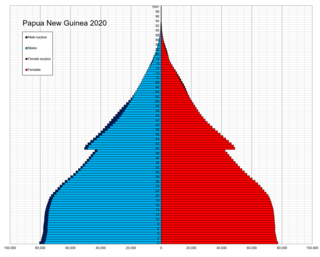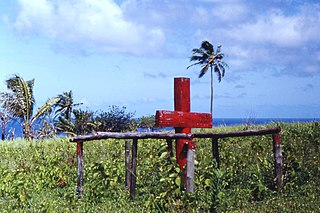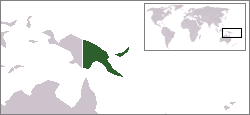This article appears to be a dictionary definition .(May 2023) |
The term citizen enterprise started to be used in the United States in 2008 to describe businesses that practice corporate social responsibility (CSR).
This article appears to be a dictionary definition .(May 2023) |
The term citizen enterprise started to be used in the United States in 2008 to describe businesses that practice corporate social responsibility (CSR).
In some countries, such as Papua New Guinea, the term is used to describe companies owned by citizens of that country, rather than by foreigners. [1]
It should not be confused with social enterprise, which is a more complex notion involving origin, ownership and participation as well as objectives, activities and the use of profits.

Papua New Guinea, officially the Independent State of Papua New Guinea, is a country in Oceania that comprises the eastern half of the island of New Guinea and its offshore islands in Melanesia. Its capital, located along its southeastern coast, is Port Moresby. The country is the world's third largest island country, with an area of 462,840 km2 (178,700 sq mi).

The indigenous population of Papua New Guinea is one of the most heterogeneous in the world. Papua New Guinea has several thousand separate communities, most with only a few hundred people. Divided by language, customs, and tradition, some of these communities have engaged in endemic warfare with their neighbors for centuries. It is the second most populous nation in Oceania, with a total population estimated variously as being between 9.5 and 10.1 million inhabitants.

Melanesia is a subregion of Oceania in the southwestern Pacific Ocean. It extends from New Guinea in the west to the Fiji Islands in the east, and includes the Arafura Sea.

A cargo cult is a Melanesian indigenist millenarian belief system, often characterised as one in which adherents perform rituals which they believe will cause a more technologically advanced society to deliver goods. The consensus amongst scholars is however more nuanced, noting that such movements have to be understood as counter-colonial reactions to changing social and economic conditions, and that the 'cargo' aspect of such movements has been decontextualized, to the detriment of a fuller understanding.

The indigenous peoples of Western New Guinea in Indonesia and Papua New Guinea, commonly called Papuans, are Melanesians. There is genetic evidence for two major historical lineages in New Guinea and neighboring islands: a first wave from the Malay Archipelago perhaps 50,000 years ago when New Guinea and Australia were a single landmass called Sahul and, much later, a wave of Austronesian people from the north who introduced Austronesian languages and pigs about 3,500 years ago. They also left a small but significant genetic trace in many coastal Papuan peoples.
Hiri Motu, also known as Police Motu, Pidgin Motu, or just Hiri, is a language of Papua New Guinea, which is spoken in surrounding areas of Port Moresby.

The National Parliament of Papua New Guinea is the unicameral national legislature in Papua New Guinea. It was created in 1964 as the House of Assembly of Papua and New Guinea but gained its current name after the nation was granted independence in 1975.

Religion in Papua New Guinea is dominated by various branches of Christianity, with traditional animism and ancestor worship often occurring less openly as another layer underneath or more openly side by side with Christianity. The courts, government, and general society uphold a constitutional right to freedom of speech, thought, and beliefs. A secular state, there is no state religion in the country, although the government openly partners with several Christian groups to provide services, and churches participate in local government bodies.

The Anglican Church of Papua New Guinea is a province of the Anglican Communion. It was created in 1977 when the Province of Papua New Guinea became independent from the Province of Queensland in the Church of England in Australia following Papua New Guinea's independence in 1975.
The Papua New Guinean honours system is the main system of honouring citizens of Papua New Guinea for their services to the country; it consists of three Orders and several medals. After independence, Papua New Guinea used the Imperial honours system, however, in recognition of the nation's 30th anniversary, a new awards system was adopted. The official announcement of its creation was made by Prime Minister Sir Michael Somare on 12 November 2004 and the first investitures were performed by the Princess Royal in early October 2005. The Imperial honours system is still in use as well, however, and the King issues a Papua New Guinean List as part of every Birthday and New Year Honours List.

Lesbian, gay, bisexual, and transgender (LGBT) persons in Papua New Guinea face legal challenges not experienced by non-LGBT residents. Male same-sex sexual activity is illegal, punishable by up to 14 years' imprisonment, but the law is not enforced.

The Papua New Guinean passport is issued to citizens of Papua New Guinea for international travel.

The monarchy of Papua New Guinea is a system of government in which a hereditary monarch is the sovereign and head of state of Papua New Guinea. The current Papua New Guinean monarch and head of state, since 8 September 2022, is King Charles III. As sovereign, he is the personal embodiment of the Papua New Guinean Crown. Although the person of the sovereign is equally shared with 14 other independent countries within the Commonwealth of Nations, each country's monarchy is separate and legally distinct. As a result, the current monarch is officially titled King of Papua New Guinea and, in this capacity, he and other members of the royal family undertake public and private functions domestically and abroad as representatives of Papua New Guinea. However, the King is the only member of the royal family with any constitutional role.

The continent of Australia, sometimes known in technical contexts by the names Sahul, Australia-New Guinea, Australinea, Meganesia, or Papualand to distinguish it from the country of Australia, is located within the Southern and Eastern hemispheres. The name "Sahul" takes its name from the Sahul Shelf, which is a part of the continental shelf of the Australian continent. The continent includes mainland Australia, Tasmania, the island of New Guinea, the Aru Islands, the Ashmore and Cartier Islands, most of the Coral Sea Islands, and some other nearby islands. Situated in the geographical region of Oceania, Australia is the smallest of the seven traditional continents.
The National Intelligence Organization (NIO) is the intelligence agency of Papua New Guinea.

The Sepik is the longest river on the island of New Guinea, and the second largest in Oceania by discharge volume after the Fly River. The majority of the river flows through the Papua New Guinea (PNG) provinces of Sandaun and East Sepik, with a small section flowing through the Indonesian province of Papua.
Papua New Guinea (PNG) is a constitutional parliamentary democracy with an estimated population of 6,187,591. Police brutality, provincial power struggles, violence against women, and government corruption all contribute to the low awareness of basic human rights in the country.

A foreign national wishing to enter Papua New Guinea must obtain a visa in one of the PNG diplomatic missions, unless they are a citizen of one of the countries eligible for visa on arrival or eVisa. All visitors must hold a passport valid for 6 months.
The Papua New Guinea Greens Party or PNG Greens are a minor political party in Papua New Guinea. Founded in 2001, the party took part in the 2002, 2007, 2012 and 2017 general elections, without winning a seat. They are a member of the Global Greens and of the Asia Pacific Greens Federation.

The COVID-19 pandemic in Papua New Guinea is part of the worldwide pandemic of coronavirus disease 2019 caused by severe acute respiratory syndrome coronavirus 2. The virus was confirmed to have reached Papua New Guinea on 20 March 2020. On 4 May 2020, Papua New Guinea was declared COVID-19 free. However, on 20 June, the government confirmed another case of COVID-19, meaning that the disease was present again within the country.